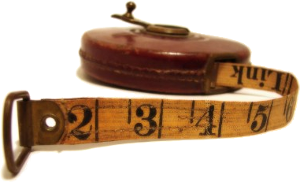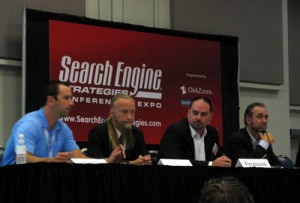Sitting beside my radio co-host Jim Hedger I have the pleasure of attending the “Meaningful SEO Metrics” session with June Li, Horst Joepen, and Chris Boggs are speaking with Richard Zwicky moderating.
This is a “as it happens” post so you’ll have to pardon if it’s disjointed – I’m going to be including the points as fast as I can. 🙂

June Li started by discussing the importance of first determining what data is meaningful. CTR, conversions and all the conflicting opinions are relevant provided that you understand the purpose of the data or that data segment.
She agrees with moderator Richard Zwicky’s statement that if you filter what you don’t want you may miss opportunities you didn’t know existed. She then goes on to reinforce the importance of clearly defining what the goals are for each type of traffic and understand what you’re looking for in the data and the opportunities. She paints the right picture when she tells us to be a teenager again and ask, “So what?” What does the data mean and why should we care. These questions need to be re-asked periodically to determine what’s relevant as time passes.

She discusses how important it is to look at the big picture. The conversion funnel and seeing who is exiting will help shape future efforts be them to improve the experience for though not converting or shifting the focus away from them. The keyword/message/landing page combinations for the non-performing traffic may well provide new opportunities. The question may not be the phrases, it may be the ad or the site itself.
It’s important to look at technical sides of the site if you see high time on site but lower conversions you need to look at what those visitors are doing and see if there’s a technical issue stopping them such as a broken form.
She recommends the same book I did in this blog a few years ago – Waiting For Your Cat To Bark.
Horst Joepen is up next. I had the pleasure of interviewing him for Webcology just a couple weeks ago.
His company pulls massive data over broad numbers of phrases. He starts off discussing keyword metrics when determining targets. Watching phrases and search volumes over time, he believes, is a key to selecting good targets.
He uses a ranking score in their systems to rate the keywords based on search volumes, potential to to convert just to name a couple metric points.
He brings up graphs relative to the huge drops JC Penny took after the penalties. He didn’t discuss the issue itself but rather used it as an example of their software’s ability to measure and record data.
Chris Boggs is up last. He starts chatting about ROI models (and how to gain more budget for SEO). His talk is more geared to SEO’s and how we can measure and predict ROI to gain more marketing budget from clients.
Predicting ROI for SEO is complex but possible.
He believe we shouldn’t be caring about rankings but rather traffic. I personally agree and disagree but that’s a side point. 🙂
To predict ROI one needs to know conversion data and knowing the strategies underway and keyword volume, one can predict (loosely) what the traffic growth would be and thus, the ROI based on average conversion data. This assumes that the broad keywords for longtail phrases gaining traffic from content generation have roughly the same conversions and/or you have separate calculations for the traffic anticipated for these phrases.
He points out that it’s important to discuss with clients that it’s not a silver bullet and it can take month and that in the short term, traffic may actually drop depending on the changes necessary.
He went into the math of determining the ROI – I will link to that info when it is available online as there were graphs that would make a written post irrelevant.
Now for the Q&A:
Q – Justification of using PPC metrics for organic SEO?
A – Yes as long as you take into account quality score, etc.
Q – 3 most common error in analytics?
A – ignoring brand terms with modifiers. A little disagreement between Horst and Chris on whether you should bid your brand on PPC if you rank organically. Chris thinks you should always go for both if you have the budget.
Q – Bid value for PPC ?
A – Base bidding on the ROI not position. Determine what a phrase is worth and base the bids on what it’s ROI is, not just to rank. Also, considering the combined value (are searchers searching twice and click paid once and organic another?) The first time I heard this discussed was in 2006 with a whitepaper on just the topic.
I’ve had to summarize a LOT and I hope you found some value it this post. For more information you’ll just have to attend the next event. 🙂